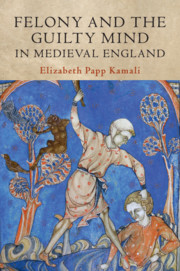Book contents
- Felony and the Guilty Mind in Medieval England
- Studies in Legal History
- Felony and the Guilty Mind in Medieval England
- Copyright page
- Dedication
- Contents
- Figures
- Acknowledgments
- A Note on the Text
- Abbreviations
- Introduction
- Part I Felonia Felonice Facta: Felony and Intentionality
- Part II Þe Deuylys Doghtyr of Hellë Fyre: Felony and Emotion
- Part III Handlyng Synne: Guilt and Innocence
- Part IV Dies Iræ: Judge and Jury
- 7 Tales of Judging
- 8 The Mind and Comportment of Judge and Jury
- Conclusion
- Bibliography
- Index
7 - Tales of Judging
from Part IV - Dies Iræ: Judge and Jury
Published online by Cambridge University Press: 18 July 2019
- Felony and the Guilty Mind in Medieval England
- Studies in Legal History
- Felony and the Guilty Mind in Medieval England
- Copyright page
- Dedication
- Contents
- Figures
- Acknowledgments
- A Note on the Text
- Abbreviations
- Introduction
- Part I Felonia Felonice Facta: Felony and Intentionality
- Part II Þe Deuylys Doghtyr of Hellë Fyre: Felony and Emotion
- Part III Handlyng Synne: Guilt and Innocence
- Part IV Dies Iræ: Judge and Jury
- 7 Tales of Judging
- 8 The Mind and Comportment of Judge and Jury
- Conclusion
- Bibliography
- Index
Summary
Chapter 7 turns to the broader issue of felony judging. Methodologically, the chapter relies more heavily on extra-legal sources, both religious and more purely literary, due to the limited discussion of approaches to decision-making by justices and juries within legal records. The chapter emphasizes the dangers involved in the act of judging but also suggests that emphasis on the dangers can obscure the prosaic nature of judging in medieval England. Despite concerns with the Last Judgment, medieval culture embraced prudential judgment as a routine fact of life. One finds medieval English men comfortably handing down verdicts in a wide range of disputes, felony cases being only the most extreme example due to the blood sanctions attached to them. The chapter considers how individuals reconciled their fear of judging with the expectation that they issue verdicts in routine and extreme cases alike, calling attention both to the ubiquity of judging in daily life and concerns over recidivism and crime that helped counterbalance fears of the Last Judgment.
- Type
- Chapter
- Information
- Felony and the Guilty Mind in Medieval England , pp. 245 - 269Publisher: Cambridge University PressPrint publication year: 2019

